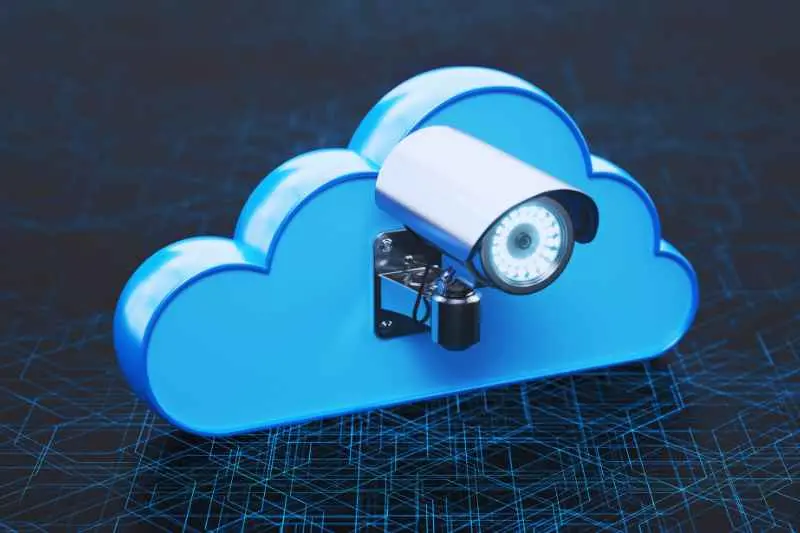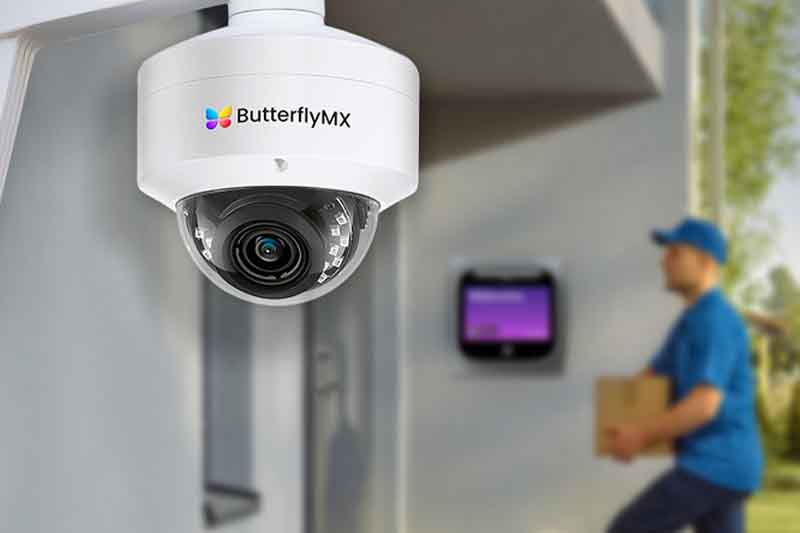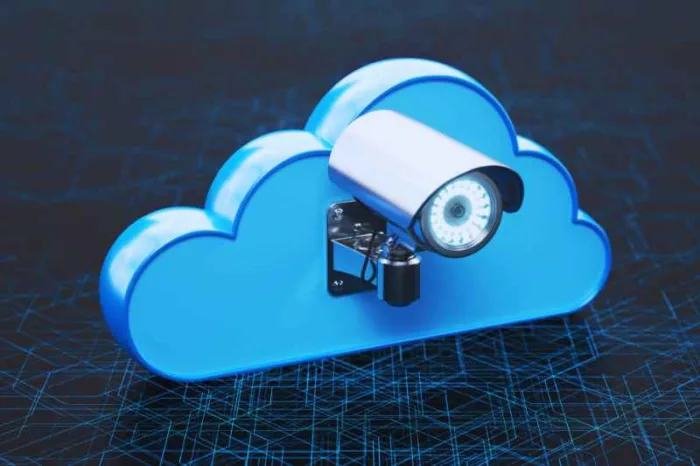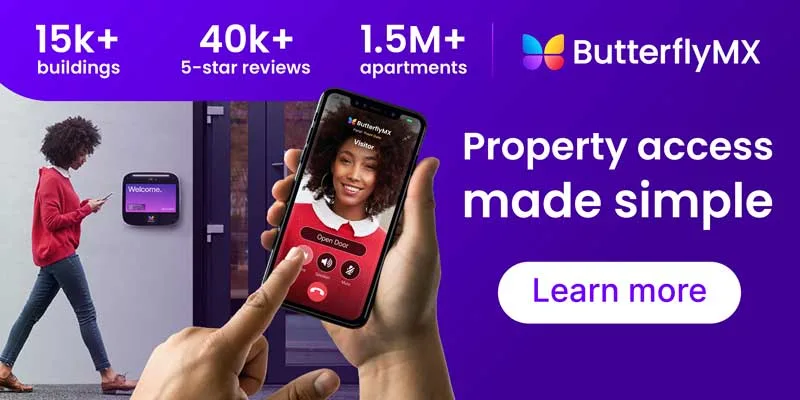Key takeaways
- Cloud-based camera systems store footage over the internet instead of relying on physical, on-premise storage.
- Benefits of cloud cameras include remote access, scalability, cost-effectiveness, and easy installation.

One of the most significant technology advancements in recent years for multifamily and commercial properties is cloud-based security cameras. These innovative systems offer a range of benefits that can transform how property managers oversee their properties.
In this post, we’ll examine the best cloud camera system to buy. Next, we’ll review how cloud-based systems work and their top benefits. Lastly, we’ll cover how to implement these cameras at your property.
This post covers:
- The best cloud-based camera system
- What is a cloud-based camera system?
- Top benefits of cloud-based security cameras
- Cloud-based camera FAQs
The best cloud-based camera system
The ButterflyMX Bullet and Dome Cameras are the best cloud-based security cameras for businesses and multifamily properties. ButterflyMX is currently installed in over 15,000 buildings and has over 40,000 five-star reviews.
Features of ButterflyMX Cameras include:
- Robust and resilient design. Our Security Cameras are engineered to endure severe weather conditions and resist tampering. You can rely on our system for long-term durability and reliable performance at your property. This robust design translates to fewer replacements and repairs, saving you money in the long run.
- HD video quality with night vision. Experience high-definition video that delivers clear and detailed footage even in low-light settings. This feature ensures you can monitor your properties around the clock, enhancing security and providing peace of mind.
- Effortless PoE wiring and installation. Power over Ethernet (PoE) simplifies the installation process and reduces costs while also making maintenance easier. This streamlined approach ensures a trouble-free setup.
- Access control integration. When combined with our Access Control System, our Cameras create a cohesive security solution. This integration allows you to manage and monitor access from a single, unified platform.
- Extensive property coverage. With a range of models, such as Dome and Bullet Cameras, ButterflyMX provides versatile options to cover various areas of your property. This flexibility ensures comprehensive 24/7 monitoring tailored to your property’s specific needs.
- ONVIF Compatibility. Our cameras’ ONVIF (Open Network Video Interface Forum) compatibility facilitates seamless integration with a broad array of third-party security systems. This adaptability makes it simpler to upgrade or expand your security setup.
Watch how ButterflyMX works:
What is a cloud-based camera system?
Before diving into the benefits, it’s essential to understand what cloud-based security cameras are. Unlike traditional CCTV systems, which rely on physical storage devices and on-site recording, cloud-based security cameras transmit and store footage over the internet. This means that video data is saved to remote servers maintained by cloud service providers, allowing for real-time access and management from virtually anywhere. These types of security cameras are also known as commercial IP cameras.
Top benefits of cloud-based security cameras
Cloud-based camera systems come with a number of key advantages over other types of security cameras.
The top benefits of cloud-based camera systems include:
- Remote access
- Scalability
- Cost-effectiveness
- Enhanced security
- Advanced analytics
- Easy installation and maintenance
1. Remote access
One of the most compelling advantages of cloud-based security cameras is the ability to access and manage video footage remotely. Property managers can monitor live feeds from their office, home, or even while traveling. This flexibility ensures that security oversight is continuous and responsive without being tethered to a physical location. The ability to view multiple camera feeds simultaneously or zoom in on specific areas from any internet-enabled device enhances the capacity to manage security effectively.
2. Scalability
Cloud-based security systems are highly scalable, making them ideal for properties of varying sizes and complexities. Whether managing a single commercial building or a sprawling multi-unit residential complex, property managers can easily add or remove cameras as needed. This scalability ensures that the security system can grow with the property, accommodating changes in layout, usage, or security requirements without the need for major infrastructure overhauls.
3. Cost-effectiveness
While the initial investment in cloud-based security cameras might be higher than traditional systems, the long-term cost benefits are substantial. Cloud solutions eliminate the need for expensive on-site hardware and storage. Additionally, many cloud service providers offer subscription-based models, which can be more manageable for budgeting purposes. Maintenance and upgrades are also handled by the service provider, reducing the need for in-house technical support and associated costs.
4. Enhanced security
Security is a top priority when it comes to surveillance footage. Cloud-based systems offer advanced encryption protocols and secure access controls that protect video data from unauthorized access. With data stored off-site in secure data centers, the risk of data loss due to physical theft, fire, or other on-site incidents is significantly reduced. Many cloud services also include backup and redundancy measures to ensure that data remains safe and accessible even in the event of a system failure.

5. Advanced analytics
Cloud-based security cameras often come with a suite of advanced features that go beyond traditional video recording.
These features can include:
- Motion detection and alerts. Cameras can be set to detect unusual movement and send instant notifications to property managers, allowing for rapid response to potential security breaches.
- Video analytics. Advanced analytics can provide insights into traffic patterns, identify suspicious behavior, and even generate reports to help in decision-making and improving security protocols.
6. Easy installation and Maintenance
Installing traditional CCTV systems can be labor-intensive, requiring significant wiring and physical setup. Cloud-based security cameras simplify this process by leveraging wireless technology. This not only reduces installation time but also minimizes disruption to the property. Maintenance is also streamlined, as service providers handle software updates and system improvements remotely, ensuring that the system remains up-to-date with the latest features and security patches.
Cloud-based camera FAQs
- What is the average cloud-based camera system price?
- Is there a camera system that works without the internet?
- What is the difference between cloud-based and NVR?
- Are cloud cameras safe?
- How long do security cameras keep footage in cloud?
What is the average cloud-based camera system price?
The average price for a cloud-based camera system typically ranges from $100 to $300 per camera, depending on features and brand. However, commercial-grade cameras can cost significantly more.
How much does the cloud cost for security cameras?
Some cloud-based cameras charge a monthly fee for additional cloud data storage. This fee can be as low as $10 and as high as $100, depending on the service provider and additional features included in the package that you purchase.
Is there a camera system that works without the internet?
There are a number of different camera systems that work without the internet. These are especially useful if your property does not have accessible WiFi. However, a cloud-based camera system is easily the best camera type to buy if your building does have internet access.
What is the difference between cloud-based and NVR?
Cloud-based camera systems store footage online via the internet, offering remote access and often a subscription fee for storage. NVR (Network Video Recorder) systems store footage locally on a physical recorder and require a network connection for access. Cloud-based systems are generally easier to set up and manage remotely, while NVR systems can offer greater control over local storage and may not incur ongoing subscription costs.
Are cloud cameras safe?
Cloud cameras are safe. They can be made additionally secure if you use strong passwords, enable two-factor authentication, and keep the firmware updated.
How long do security cameras keep footage in the cloud?
The length of time that your cameras will store footage in the cloud depends on your specific data plan. Some systems delete footage after a set period of time. Other systems never delete your footage unless you choose to do so.

Get your free quote!
Fill in the form below, and we'll email you right back.
Want a free quote?
Fill in the form below, and we'll email you right back.
You’ll be redirected shortly...






